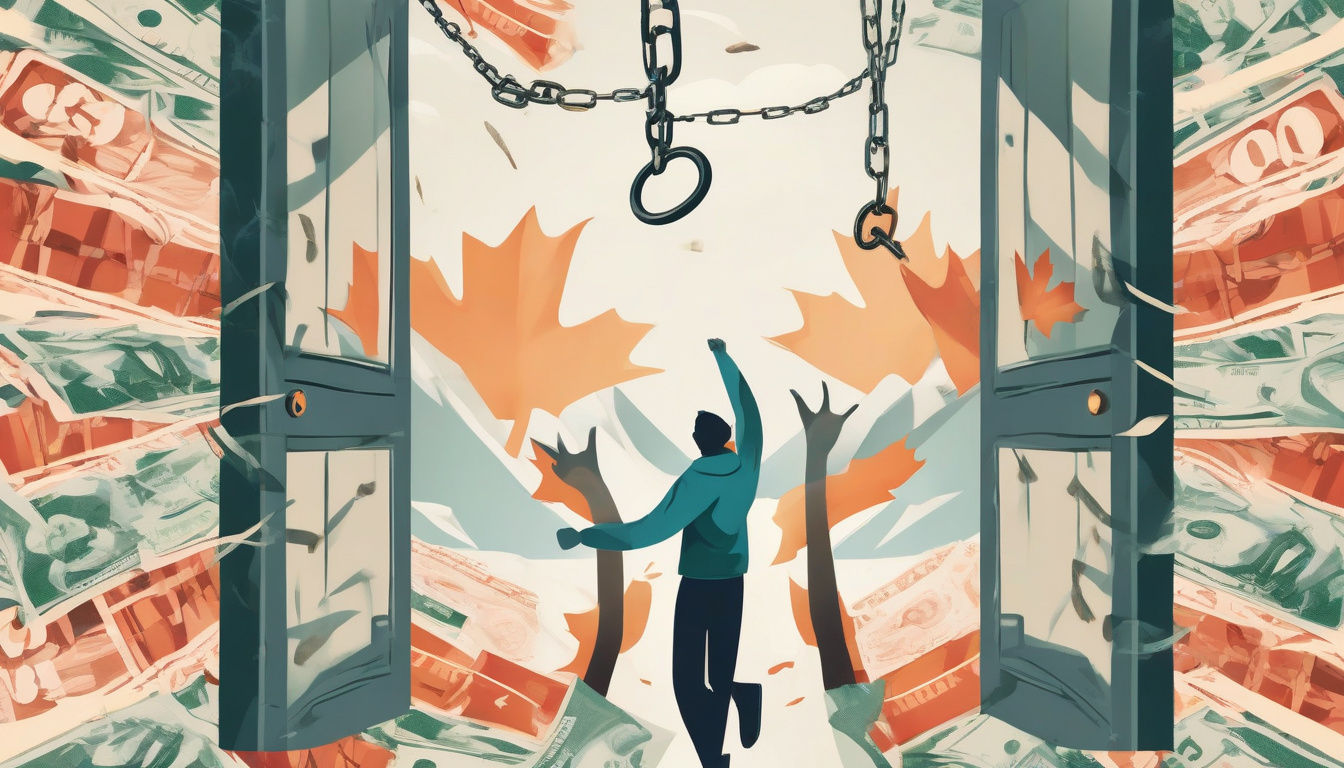In today’s fast-paced world, many individuals find themselves overwhelmed by mounting debt, leading to a sense of hopelessness and financial despair. Debt settlement companies have emerged as a viable solution for those seeking to regain financial control and achieve lasting financial freedom. In this article, we will explore what debt settlement companies are, how they operate, and the benefits they offer in alleviating financial burdens. We’ll discuss key considerations to keep in mind when choosing a debt settlement company, including potential risks involved in the process. Finally, we’ll provide actionable steps to take after settling debt to ensure you maintain your newfound financial stability. By the end of this guide, you’ll have a comprehensive understanding of how debt settlement can be a key strategy in your journey towards financial independence.

Key Takeaways
- Debt settlement companies negotiate on your behalf to reduce the total amount of your debt.
- Using these companies can lead to lower monthly payments and quicker debt resolution.
- It’s essential to research and select a reputable debt settlement company to avoid scams.
- There are potential risks involved, such as impacts on your credit score and fees charged by these companies.
- Post-settlement, maintaining good financial habits is crucial for long-term control over your finances.
Understanding Debt Settlement Companies: What They Are and How They Work
Debt settlement companies are organizations that assist individuals in negotiating and resolving their unsecured debts, often by reaching lower payoff amounts with creditors. These companies typically charge a fee for their services, which may be based on a percentage of the debt being settled or a flat fee arrangement. The primary goal of debt settlement is to help consumers achieve financial relief by negotiating with creditors to reduce the total amount owed on debts, such as credit cards or medical bills.
When you engage with a debt settlement company, representatives will review your financial situation and help you develop a plan. This plan often involves ceasing payments on your debts and redirecting those funds into a savings account. The intention is to accumulate enough savings to make lump-sum offers to creditors at a lower amount than the original debt.
One common misconception about debt settlement companies is that they can directly influence your credit score in a positive way. In reality, while a successful negotiation can lead to reduced payments, settling debts may initially impact your credit score negatively since accounts in debt settlement may be marked as ‘settled for less than owed.’
Moreover, debt settlement is not a one-size-fits-all approach. It is important for consumers to understand that not every debt is eligible for settlement, and certain factors such as the amount owed, types of creditors, and your overall financial situation play significant roles.
By working with a reputable debt settlement company, you can navigate the complexities of debt resolution, but it’s critical to conduct due diligence and research different companies’ credentials and success rates.
The Benefits of Using Debt Settlement Companies for Financial Relief
Debt settlement companies can serve as a powerful resource for individuals grappling with overwhelming financial burdens. These organizations work on behalf of clients to negotiate with creditors, aiming to reduce the total amount owed through a lump-sum payment or series of manageable installments. One of the primary benefits of using a debt settlement company is the potential for significant savings. Clients often find that they can settle their debts for considerably less than the original amount owed, alleviating the financial strain and allowing for a fresher financial start.
Another advantage is the expertise and negotiation skills that these companies bring to the table. Trained professionals understand the intricacies of the debt collection process and are often more effective in reaching favorable terms with creditors than individuals negotiating on their own. This can be particularly beneficial in cases where clients feel overwhelmed or intimidated by the process.
Additionally, utilizing a debt settlement company can help to relieve some of the emotional stress associated with debt. Instead of facing persistent calls from creditors, clients can delegate communication to the professionals, allowing them to focus on their recovery and rebuilding their financial health. Furthermore, many debt settlement companies offer educational resources, helping clients to improve their financial literacy and avoid similar situations in the future.
Overall, engaging with a debt settlement company can provide a structured approach to managing debt, potentially leading to more sustainable outcomes than other options such as bankruptcy or prolonged credit card debt.
‘The lack of money is the root of all evil.’ – Mark Twain

How to Choose the Right Debt Settlement Company
Choosing the right debt settlement company can significantly impact your financial recovery and peace of mind. With countless options available, it’s essential to approach this decision with care and diligence. Start by researching companies that are accredited by reputable organizations, such as the Better Business Bureau (BBB) or the American Fair Credit Council (AFCC). Look for a company that provides clear information on their services, fees, and potential outcomes. Transparency is crucial; avoid companies that make vague promises or operate through hard sales tactics.
Moreover, check online reviews and testimonials to gauge the experiences of former clients. A reputable debt settlement company should have a track record of satisfied customers and a low rate of complaints. Additionally, inquire about their approach to settling debts. Effective companies will negotiate reasonable settlements with creditors rather than pushing you towards bankruptcy or suggesting unrealistic repayment plans.
Furthermore, validate the company’s legal compliance. Make sure they adhere to federal and state regulations concerning consumer debt relief. It’s essential to have meaningful conversations with multiple companies; take note of how they treat you during your inquiries. Selecting a company that values customer support and offers personalized solutions is imperative.
In conclusion, carefully considering various factors, such as accreditation, transparency, client feedback, and legal compliance, will guide you in choosing the right debt settlement company to address your financial challenges.
Potential Risks and Considerations in Debt Settlement
Debt settlement companies can offer relief from overwhelming financial burdens, but the road to financial recovery is not without its challenges. Understanding the potential risks and considerations involved in working with debt settlement companies is crucial before taking the plunge.
1. Impact on Credit Score:
One of the most immediate risks of engaging with debt settlement companies is the negative impact on your credit score. While negotiating lower payments can provide immediate relief, missed payments during negotiations can mar your credit history, making it harder to secure loans or favorable interest rates in the future.
2. Fees and Costs:
Debt settlement companies often charge significant fees for their services, which can eat into any savings gained from negotiated settlements. It’s important to thoroughly review the fee structure upfront and ensure that the potential savings outweigh these costs.
3. No Guaranteed Results:
Debt settlement companies may promise significant reductions in debt, but outcomes can vary widely. Not all creditors are willing to negotiate, and even those who are may not accept the terms the debt settlement company proposes. This uncertainty can lead to frustration and additional financial strain.
4. Legal Risks:
Some companies may instruct clients to stop paying their debts to negotiate lower settlements. This strategy can lead to lawsuits from creditors, debt collection actions, or additional financial penalties. Understanding the legal implications of signing up with a debt settlement company is essential to avoid exacerbating financial issues.
5. Tax Implications:
Settlements achieved through debt settlement companies can be reported as taxable income by the IRS if the forgiven amount exceeds a certain threshold. This means that while you might reduce your debt, you could end up with a tax liability that undermines your financial recovery.
6. Alternative Solutions:
Finally, addressing debt through other means such as credit counseling, debt management plans, or personal bankruptcy might present fewer risks and concerns. Examining all avenues before choosing debt settlement is prudent to ensure the best financial path is taken.
In conclusion, while debt settlement companies can alleviate debt for many, the associated risks and considerations highlight the importance of doing thorough research and evaluating personal financial circumstances before engaging their services. Understanding these potential pitfalls will help consumers make informed choices about their debt management strategies.

Steps to Take After Debt Settlement: Regaining Financial Control
Once you’ve successfully completed a debt settlement process through debt settlement companies, reclaiming your financial control becomes paramount. Regaining financial stability is not just about extinguishing old debts; it involves strategic planning and proactive measures that ensure you don’t fall back into the same traps. Here are some essential steps to take immediately after your debt is settled:
1. Review Your Credit Report: Check your credit report to ensure that the settled debts are marked appropriately. This will often reflect as ‘settled’ or ‘paid’ and can influence future lending decisions.
2. Create a Budget: Develop a detailed budget that focuses on your income and essential expenses. Budgeting helps you track your spending habits and prioritizes saving for future expenses.
3. Establish an Emergency Fund: Start setting aside a small amount each month to build an emergency fund. This fund should ideally cover three to six months of living expenses to protect against unexpected financial shocks.
4. Avoid New Debt: Resist the temptation to take on new debt immediately after settling. Living within your means is crucial for sustaining your financial health after debt settlement.
5. Improve Your Credit Score: Invest time in improving your credit score. Regularly pay your bills on time, reduce your credit card balances, and avoid applying for new credit until you’re financially stable.
6. Consult with a Financial Advisor: If budgeting and managing finances feel overwhelming, consider seeking help from a financial advisor. They can provide personalized advice based on your financial situation.
These steps are essential for transforming your financial situation and ensuring you stay on the path to lasting recovery and control over your finances.
Frequently Asked Questions
What are debt settlement companies?
Debt settlement companies are organizations that negotiate with creditors on behalf of individuals struggling with debt, aiming to reduce the total amount owed. They typically offer structured payment plans to help you settle your debts for less than you owe.
What are the benefits of using debt settlement companies?
The benefits include potential reductions in your total debt, a structured repayment plan, professional negotiation with creditors, and the possibility of avoiding bankruptcy, allowing you to regain financial control.
How do I choose the right debt settlement company?
When selecting a debt settlement company, look for factors such as their accreditation, experience, customer reviews, fee structure, and transparency regarding the settlement process and potential risks.
What are the risks associated with debt settlement?
Potential risks include negative impacts on your credit score, no guarantee that creditors will agree to settle, fees that could accumulate, and the possibility of being sued by creditors if payments are not managed properly.
What should I do after my debt is settled?
After settling your debt, focus on rebuilding your credit, creating a budget, saving for emergencies, and continuing financial education to avoid future debt issues and enhance your financial stability.
